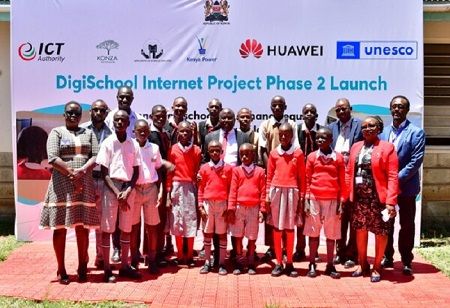Huawei, UNESCO, and government stakeholders formally declared the successful completion of Phase II of the Kenya DigiSchool Connectivity Project, which brought 21 schools online, 6 of which are for students with special educational needs.
In line with the government's Digital Superhighway Agenda and the vision to network all Kenyan schools onto the Internet, the DigiSchool initiative is a collaborative effort between Kenya's Ministry of Education, Ministry of ICT and Digital Economy, Kenya Power (KPLC), UNESCO, and Huawei TECH4ALL.
The event of announcement, held on March 14 at Machakos Primary School for the Deaf, was conducted by Eng. John Tanui CBS, Principal Secretary of the State Department of ICT and Digital Economy in Kenya. The school is among schools for deaf children that were linked to the country's high-speed fiber broadband network during the second phase of the project.
"We are here at Machakos Primary School for the Deaf to make sure the school gets connected to the national fiber so they can learn better and contribute to better learning outcomes. Given that visual access is paramount for the deaf, the package also comprises of a video conferencing solution", said Eng. John Tanui CBS, Principal Secretary for the State Department of ICT and Digital Economy. "As government, we appreciate the role of the private sector players in facilitating such a life-transforming program at Machakos Primary School for the Deaf. In fact, this is a grand project that requires strategic partnership with partners such as Huawei and UNESCO. We hope to continue transforming lives and livelihoods together, as we take the digital inclusion agenda forward".
The video conferencing technology allows Kenya Institute of Special Education (KISE) to offer distant support to school administrators, teachers, and students at deaf schools, improving teaching capacity at the schools and enhancing access to a range of services.
"With these solutions, connectivity is enhancing the effectiveness of education management. It is enabling head teachers to access management systems online. It is enhancing access to education resources online – be it videos, curriculum, or experts. And classroom connectivity is making learning more engaging, enjoyable, and effective. In special educational needs schools, connectivity is assisting experts in offering assessment and rehabilitation services remotely", said Stephen Zhang, Deputy CEO for Huawei Kenya.
At the announcement ceremony, visitors had the firsthand experience of how children work with the Internet in class as well as the advantages of online video call interactions between students and KISE specialists.
"UNESCO is eager to continue partnering with the Kenya government, Huawei, and the rest of stakeholders to guarantee accessible and equitable quality education and build inclusive and effective lifelong learning systems for all according to Sustainable Development Goal 4 and the ideals of the National Education Sector Strategic Plan", averred Louise Haxthausen, UNESCO Regional Director in Eastern Africa.
As part of its long-term digital inclusion program TECH4ALL, Huawei has been sponsoring the DigiSchool Connectivity Project from the inauguration of Phase I, and is tasked with technical surveys, solution design, equipment supply, and project management. Linking to the government-owned fiber-optic network NOFBI, Huawei's FTTR-B and all-optical access quickly deployable solutions provide high-quality, all-optical Wi-Fi connectivity and a high-speed network experience for online learning classes and live video classes on the target schools.
Phase 1 of the DigiSchool project linked 13 schools to the Internet, with benefits to 6,000 students and teachers. An assessment of Phase I concluded that:
- 98% of students reported that the Internet fulfills their educational requirements.
- 84% indicated that the Internet enhances learning as being more interesting.
- 71% reported that resources online make it easier to comprehend complicated ideas.

